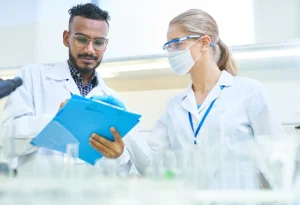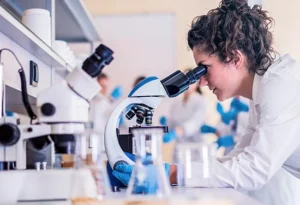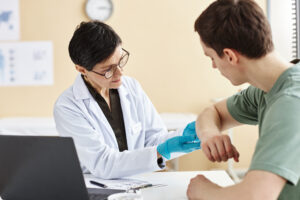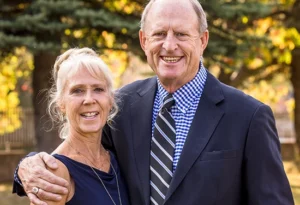May 15, 2020

The COVID-19 pandemic has touched everyone’s lives, changing the way we all live, work, and interact with each other. Its effects will be profound and long-lasting, which means that JDRF needs to understand and respond to its impact on both the type 1 diabetes (T1D) community and the research that still needs to happen. Knowing that many research institutes are closed or have temporarily diverted staff or resources to the COVID-19 pandemic, we are now asking the question: What does this mean for T1D research?
JDRF is working hard to navigate through the challenges of the current environment and to ensure that T1D research can continue in a way that prioritises the safety of researchers and research participants. With our unwavering commitment to finding better treatments and cures for T1D, critical research continues to be driven by JDRF-funded researchers in Canada and around the world.
“We realize those living with T1D don’t get a break,” says Dr. Tim Kieffer, Professor in the Departments of Cellular & Physiological Sciences and Surgery at the University of British Columbia in Vancouver, “and we remain committed to our research and finding creative ways to remain productive as we strive to contribute to the development of novel therapies, and ultimately a cure.”
Several members of Dr. Kieffer’s team have received exemptions to continue to work in the lab on long-term, critical projects that have already involved substantial investment. These team members are often working in the lab alone, using new procedures to ensure their safety. For other team members who are working from home, efforts have shifted to analysis of data, writing papers and grants, planning new projects, and exploring ways to increase our lab’s efficiency.
It is unprecedented for world-class research facilities to have to limit activity to this extent – but there are some silver linings to the forced slow-down. “In my case, this has also been a great opportunity to re-assess the lab’s many projects, seek new ways to further innovate our approaches, recruit additional team members, and reach out to collaborators around the world, who while experiencing similar situations, are available to strategize and assist us in attaining our goals,” says Dr. Kieffer.
Most clinical research sites are requesting that clinical trial enrolment is paused during the COVID-19 pandemic – but clinical trials already in progress can continue, using virtual approaches to interact with patients wherever possible. Dr. Bruce Perkins, Professor of Medicine at the University of Toronto, is about halfway through an exciting clinical trial that is testing an oral medication called empagliflozin in people with T1D who are also taking insulin via an artificial pancreas system, with the aim of improving blood glucose control and making disease management easier. During the COVID-19 outbreak, Dr. Perkins and his team will continue to monitor patients on treatment through virtual visits, including advising them on troubleshooting issues with their artificial pancreas system.
Dr. Rémi Rabasa-Lhoret, Professor of Medicine and Nutrition at Montreal Clinical Research Institute (IRCM) and Centre Hospitalier de l’Université de Montréal (CHUM), was quick to adapt one of his key T1D research projects to address unmet needs in the T1D community in Quebec. He, his colleague Dr. Anne-Sophie Brazeau, and their team are developing a registry of people with T1D based in Quebec, through which registered participants can access a rich, interactive digital training platform whose content has an emphasis on hypoglycemia prevention and management. Given the importance of virtual resources during this period of social distancing, the research team altered the enrolment requirements, enabling a much broader base of people to benefit from the new online resource. They are also inviting registry participants to share information on how they have been affected by the COVID-19 outbreak, to better understand the effects of the pandemic and of COVID-19 illness in people with T1D – a topic where evidence is lacking but urgently needed. Finally, Dr. Rabasa-Lhoret and his colleagues are also contributing to an effort that will expand the use of continuous glucose monitors (CGMs) in hospitalized patients during the COVID-19 pandemic. Greater use of CGMs in hospitals will enhance patient comfort and safety, reduce spread of COVID-19 in the hospital setting, and limit the usage of personal protection equipment for healthcare professionals – important outcomes already addressed in part by the recent announcement that Abbott’s FreeStyle Libre Flash Glucose Monitor has been approved by Health Canada for use in hospitals during COVID-19.
“This pandemic situation has obliged us to revise our usual clinical care and clinical research process, requiring a very rapid shift to virtual care. Online training and tools are a great complement, allowing patients to tailor according to their personal needs. We could foresee that the changes we have made will result in durable, positive effects for people living with T1D and their families”, says Dr. Rabasa-Lhoret.
Dr. Gillian Booth, practicing endocrinologist and a scientist at the Li Ka Shing Knowledge Institute of St. Michael’s Hospital in Toronto, has found that COVID-19 is shaping the way that she is approaching her research. Dr. Booth and her team are in the process of developing a platform for delivery of virtual care for patients with T1D that will decrease the burden of attending in-person appointments and improve health outcomes. “The need for virtual care during this pandemic is highlighting all sorts of things that we may not have appreciated were important in delivering high quality care remotely,” says Dr. Booth. Her team will continue to develop the virtual care platform and carry out planning and regulatory activities required to launch the clinical trial that will test the platform’s effectiveness, all while working remotely.
While bench work in the lab of Dr. Jayne Danska, Professor, Senior Scientist and Associate Chief, Faculty Development and Diversity at SickKids Hospital, Toronto has paused, her group remains highly active with data analysis, remote collaboration and group meetings, revising manuscripts, writing research ethics applications and launching the new JDRF-CIHR funded Microbiome Team on T1D she leads with collaborators from Calgary, Guelph and New Haven, USA. She recently spearheaded a joint effort that collected and delivered personal protective equipment from all the SickKids Research Institute laboratories to frontline workers, demonstrating the commitment of the research community.
Like the T1D community, JDRF-funded researchers are strong and resilient: despite the set-backs caused by COVID-19, they will continue to innovate and pursue cures and better treatments for T1D. The field can anticipate new perspectives, renewed focus, and a surge of accelerated progress once work can fully resume.
Thanks to our donors, JDRF is ensuring T1D research doesn’t stop, and is providing Canadians living with T1D the resources they need to navigate the COVID-19 pandemic. Please consider making a donation to fuel critical research and the latest resources, advocacy and support while we continue to work toward a world without T1D.




